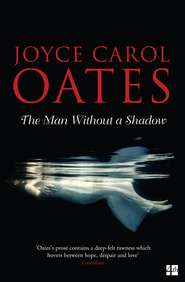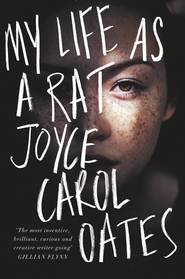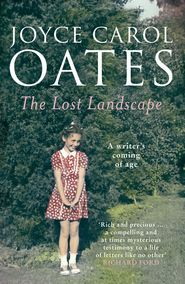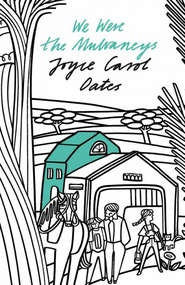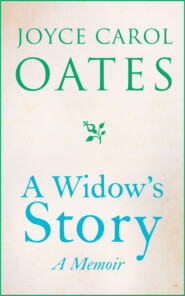По всем вопросам обращайтесь на: info@litportal.ru
(©) 2003-2025.
✖
Little Bird of Heaven
Автор
Год написания книги
2019
Настройки чтения
Размер шрифта
Высота строк
Поля
On Sunday drives Daddy would take us out to Uncle Sean’s farm.
Uncle Sean was an uncle of my mother’s, an old man with stark white fluffy hair and skin roughened as the skin of a pineapple. Ben and I were allowed to stroke the velvety noses of horses in their stalls, in the company of our cousin Ty who kept a close watch over us—“Careful! Walk on this side”—and we were allowed to brush the horses’ sides with a wire brush, warm rippling shivery sides, always you are astonished at the size of a horse, the height of a horse, the ceaseless switching of the coarse mane and the coarse stinging tail, the fresh manure underfoot, horseflies hovering in the air, repulsive. Yet I had wanted a horse of my own. I loved to press my face against the horses’ warm sides. My favorite was a mare named Molly-O, one of my uncle’s smaller horses, pebble-gray, with liquidy dark eyes that knew me, I was certain.
I wondered what it meant: here was a horse, but I was a girl.
I wondered if it was just an accident, how we are born: horse, girl.
The way after my father was lost to us in defiance of my mother I would bicycle into Sparta and past the row house where Zoe Kruller was said to have been strangled in her bed and the thought came to me unbidden, illogical If I’d lived here. Anyone who lived here. Death was meant to come here.
You want to blame them, those who’ve been killed. Any woman naked and strangled in her bed you certainly want to blame.
“…shouldn’t have shut me out like that. Your ‘Uncle Sean.’”
“Uncle Sean” was uttered in a tone of contempt, hurt. Daddy seemed to have been following my thoughts.
“All of your mother’s people, that I’d thought liked me. I mean, some of them. The men. Your ‘Uncle Sean’—”
“He isn’t my uncle, Daddy. He’s Mom’s uncle.”
“He’s your great-uncle. That’s what he is.”
I wanted to protest, that wasn’t my fault!
I wanted to protest, Uncle Sean was just an old, ignorant man. Why should Daddy care what he thinks…
“…should know that I won’t give up. A guilty man, he’d give up, he’d move away. By now he’d be vanished from Sparta. But I’m not a guilty man—anyway not guilty of that—and I mean to alter the judgment of bastards like ‘Uncle Sean’ that had no faith in me. You tell your mother, Krista: I am not going to slink away like a kicked dog, I am still fighting this. It’s been—how long—going on five years—a guilty man would’ve given up by now, but not Eddy Diehl.”
Moved by sudden emotion, Daddy reached out another time to grope for my arm, my hand. His fingers were strong, closing around my wrist. I felt a pang of alarm, a moment’s unthinking panic. Always you are astonished. Their size, their height. Their strength. That they could hurt you so easily without meaning to.
7 (#ulink_cf5f45b0-a44f-568e-a5d3-6c3cfadc6b78)
“WELL, SAY! Thought it was you.”
At Honeystone’s Dairy the person you hoped would wait on you was Zoe Kruller.
Not heavyset Audrey with the sulky dark-purple mouth like a wound, not the steely-eyed grandma Mrs. Honeystone the owner’s wife, or in the height of summer temporary hired-help, high school girls who took little interest in the names of most customers or in recalling that a finicky child might prefer one type of ice-cream cone (lighter, less crunchy) over another (darker, grainier and chewier), and want her chocolate scoop on the bottom and her strawberry on top so that, melting, the strawberry would seep into the chocolate and not the other way around which seemed to the finicky mildly repugnant, unnatural; and on sundaes no nuts, and no maraschino cherries. But Zoe Kruller knew, Zoe Kruller always remembered.
As Zoe remembered names: “Krissie, is it? H’lo there Krissie!”
Zoe was glamorous, not merely pretty. Your eye moved onto Zoe with startled interest as your eye might be drawn to a billboard face posed above the highway, you would never imagine might have the slightest consciousness of you.
If you were a child, that is. A girl-child intensely aware of adult women: their faces, their bodies.
Zoe was an adult woman, a wife and a mother. Yet you would not have guessed that Zoe was much older than the high school girls who worked behind the counter at Honeystone’s. Her face was a girl’s face, just this side of beauty: her eager smile revealed a band of pink gum and her long hungry-looking teeth overlapped just perceptibly in front. Her skin was pale, warmly freckled. Her hair was “strawberry blond”—crimped, flyaway, shoulder-length. Her eyebrows had been carefully plucked and filled in with eyebrow pencil, her pale lashes were inky with mascara. Her nose was a little too long, with a waxy tip, and wide nostrils. Her chin was a little too narrow. Yet her eyes were beautiful, exotic: shades of amber like sherry at the bottom of a glass, or a certain kind of children’s marble, amber-glazed, changing its colors as you turned it in your fingers.
Zoe was a small woman, her figure was what’s called petite. She could not have weighed more than one hundred pounds nor was she more than five feet two. Yet she exuded an air of sexy funny-girl swagger that made her appear taller, like one accustomed to the spotlight. Behind the counter at Honeystone’s Zoe had a way of rising up on her toes when she locked eyes with a customer, smiling that glistening bared-gum smile and a light seemed truly to come into her face.
“Well, say! Thought it was you.”
Most remarkable was Zoe’s throaty purring voice. It was a voice so low and shivery it didn’t seem as if it was issuing from Zoe Kruller’s wide-lipped crimson mouth but from a radio. Here was a distinctive voice amid a clamor of voices of no distinction, that made you stop and stare at Zoe even more than her lit-up face might have warranted. Here is someone special you were made to think.
That red-embroidered ZOE on a tiny pocket above Zoe’s left breast.
‘“Zooh-ey.’ Not ‘Zoo-ey.’ Please!”
In Chautauqua Park on summer nights local musicians and singers performed at the bandstand and Zoe Kruller belonged to the most popular group, that called itself Black River Breakdown. Zoe was the only woman among several men—guitarist, banjo player, fiddler and piano-player.
Except for the Elvis-looking guitarist, a kid in his early twenties with dyed-black hair and cowboy boots with a prominent heel, they were all in their thirties, ardent, excitable, yearning for applause. Their music ranged from country-and-western classics (“Little Maggie,” “Down from Dover,” “I’ll Walk the Line”) to bluegrass (“Little Bird of Heaven,” “Her Little Footprints in the Snow”) and disco (“I Will Survive,” “Saturday Night Fever”).
Especially on stage at the bandstand, sexy-seductive in a spangled dress that left most of her thighs exposed and her strawberry-blond hair frizzed and crimped in a wild halo around her head so it looked like an electric bolt had shot through her, Zoe Kruller did not resemble any other wife/mother in Sparta.
Yet she was Mrs. Kruller, the mother of a boy in Ben’s class at school. This boy was named Aaron and he looked older than Ben by a year or more and had a stiff glaring face nothing like Zoe’s.
“Zoe married young”—this was said of Mrs. Kruller, by our mother and our mother’s friends.
“Zoe married ‘way too young’”—this was said with satisfaction.
And, sometimes: “Zoe married ‘way too young and the wrong man.’”
None of this meant anything to Ben and me. Being taken for a drive out to Honeystone’s which was an actual dairy farm on the outskirts of Sparta, locally famous for its homemade ice cream and desserts, was a Sunday reward for having been good through the week, or one of Daddy’s capricious treats. Anybody interested in a ride? Honeystone’s?
Say I returned to Sparta. Say I looked up my few remaining “friends”—classmates from school—and asked what they remembered most vividly from our childhood, each would say—“Honeystone’s!” Clutching at one another’s hands, eyes misting with tears of sentiment, the sweetest sort of tears, recalling Honeystone’s Dairy as you’d recall a lost paradise.
Recalling even the drive to Honeystone’s, fraught with the happiest sort of anticipation.
Out East Huron Pike Road, past the water treatment tower. Past the railroad yard. Across the Black River Bridge and beyond East Sparta Memorial Park and a short mile or so to the Sparta town limits and there was the sparkling-white stucco building set back from the road in a neatly tended graveled parking lot bounded, in summer, by bright red geraniums in clay pots, and in the autumn by chrysanthemums of all hues; there was the smiling-cow sign thirty feet high, on a pole illuminated at night like a stage set—HONEYSTONE’S DAIRY. Inside Honeystone’s the air was immediately distinctive: milky-cool, marble-cool, like the foyer of the Midland Sparta Bank, except here there was an odor of bakery, so sweet your mouth watered like a baby’s. On the floor of Honeystone’s was what appeared to be actual marble, black-and-white checked, worn but still elegant; there were ornately designed white wrought-iron tables and chairs and there were vinyl booths that resembled leather, sleek and black. Descending from the ceiling were a half-dozen slow-moving fans with blades like the propellers of small planes, both languorous and vaguely threatening. If you were to dream of Honeystone’s interior, the slow-moving fans would take on an ominous note.
A dream of Honeystone’s might be edgy as well because you would not clearly see who’d brought you. For invariably in these dreams you are a young child in the company of an adult and you are essentially helpless.
“What can I do you for, sweetie?”
This was Zoe’s snappy way of greeting. Glamorous Zoe Kruller leaning forward onto the high counter, on her elbows, on her toes, smiling that crimson long-lipped hungry smile, baring her gums. Her eyes so exotic in black mascara, silvery-blue eye shadow and eyeliner, you gaped not knowing how to respond.
And there were other fascinating things about Aaron Kruller’s mother: the way she wore the sleeves of her white Honeystone’s smock pushed up past her elbows so that her slender arms were exposed, covered in dark little moles and freckles like tiny ants! Oh there was something ticklish—shivery—about Zoe Kruller! This giggly throaty-voiced woman about the size of a thirteen-year-old girl who made you want to sink your teeth into ice cream, bite down hard so your teeth ached, and your jaws, and you shuddered at the cold.
Honeystone’s help had to wear white smocks over white cord trousers and both smock and trousers had to be kept spotless. Honeystone’s help had to wear hairnets which made them—except for Zoe Kruller—look silly, dowdy. But on Zoe, her thick strawberry-blond hair just barely contained by the gossamer net, the effect was strangely alluring.
Zoe’s pert question—“What can I do you for, sweetie?”—was like a riddle for there was something wrong with it, words were scrambled, you had to think—and blink—and think hard to figure out what was wrong.
Do you for. Not Do for you. This was so funny!
Even Ben, who disliked being teased, especially by people he didn’t know well, laughed when Zoe Kruller leaned on her elbows to peer down at him over the counter asking what could she Do him for and calling him Daddy’s big boy.
Well, if Mommy had brought us, Zoe would call Ben Mommy’s big boy. But it wasn’t so thrilling somehow, then: Zoe wouldn’t pay much attention to us, then.
Our mother knew Zoe Kruller when she’d had a different last name. When she’d been a high school girl, the younger sister of a classmate of Lucille Bauer’s at Sparta High.
In a small city like Sparta, everyone knows everyone else. It’s a matter of age, generation. Everyone knows everyone’s family background, to a degree. There are commingled histories, intense friendships and intense feuds that, having gone underground decades before, continue to smolder and pollute the air.






